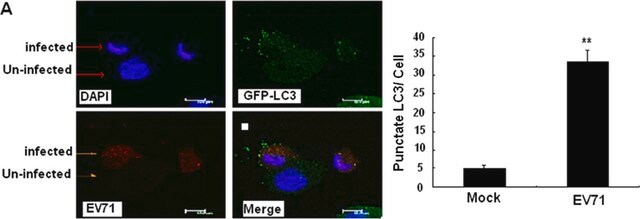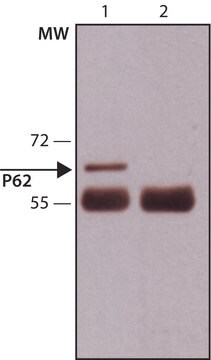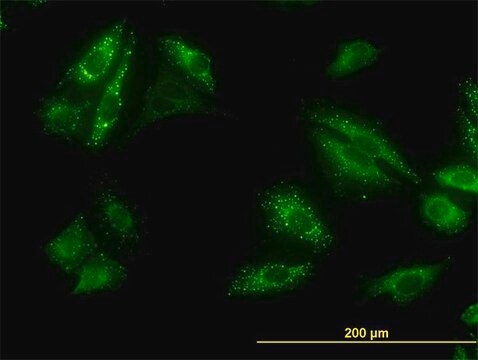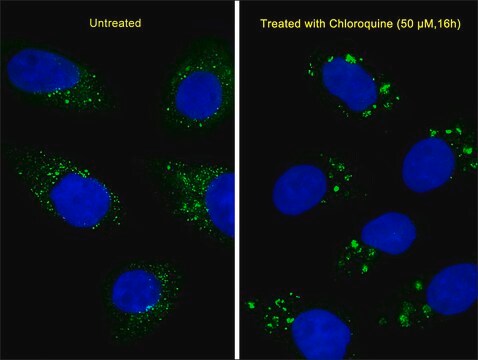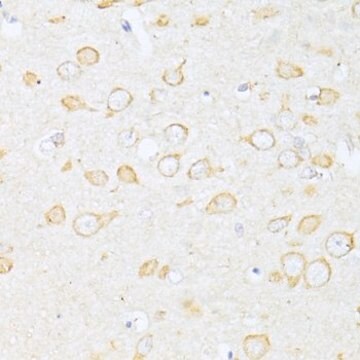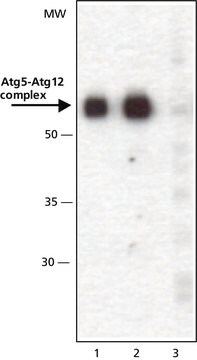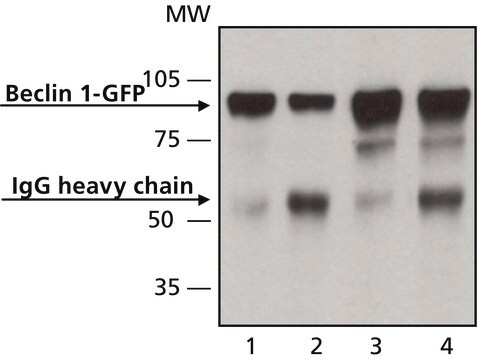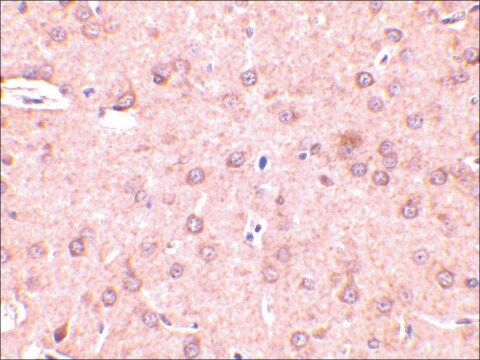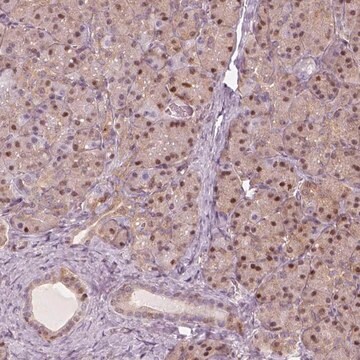추천 제품
생물학적 소스
rabbit
결합
unconjugated
항체 형태
affinity isolated antibody
항체 생산 유형
primary antibodies
클론
polyclonal
양식
buffered aqueous solution
분자량
antigen ~62 kDa
종 반응성
human, rat, mouse
포장
antibody small pack of 25 μL
농도
~1 mg/mL
기술
immunoprecipitation (IP): 1-2 μg using lysate of NIH-3T3 cells
indirect immunofluorescence: 1-2 μg/mL using human A549 cells
western blot: 1-2 μg/mL using whole extracts of rat PC12 cells
UniProt 수납 번호
배송 상태
dry ice
저장 온도
−20°C
타겟 번역 후 변형
unmodified
유전자 정보
human ... SQSTM1(8878)
mouse ... Sqstm1(18412)
rat ... Sqstm1(113894)
일반 설명
p62 or SQSTM1 (sequestosome 1) is a multifunctional, multi-domain adaptor protein which resides at the autophagosome membranes. The human p62 gene is mapped to human chromosome 5. The protein has 440 amino acids. This protein is conserved across metazoans, but not plant and fungi. It is composed of Phox1 and Bem1p (PB1) domain, a zinc finger (ZZ) domain, two nuclear localization signals, a tumor necrosis factor receptor-associated factor 6 (TRAF6) binding domain, a nuclear export signal, an LC3-interacting region (LIR), a Keap1-interacting region (KIR) and a ubiquitin-associated (UBA) domain. It is predominantly present in cytoplasm, but also shows expression in nucleus, autophagosomes and lysosomes.
Anti-p62/SQSTM1 is produced in rabbit using as immunogen a synthetic peptide corresponding to amino acids of human p62/SQSTM1 (GeneID: 8878), conjugated to KLH. The corresponding sequence is identical in rat and mouse. The antibody is affinity-purified using the immunizing peptide immobilized on agarose.
Anti-p62/SQSTM1 is produced in rabbit using as immunogen a synthetic peptide corresponding to amino acids of human p62/SQSTM1 (GeneID: 8878), conjugated to KLH. The corresponding sequence is identical in rat and mouse. The antibody is affinity-purified using the immunizing peptide immobilized on agarose.
특이성
Anti-p62/SQSTM1 recognizes human, rat, and mouse p62/SQSTM1. The antibody may be used in various immunochemical techniques including immunoblotting (~ 62 kDa), immunoprecipitation, and indirect immunofluorescence. Detection of the p62/SQSTM1 band by immunoblotting is specifically inhibited by the immunizing peptide.
면역원
Synthetic peptide corresponding to amino acids of human p62/SQSTM1, conjugated to KLH. The corresponding protein sequence is identical in rat and mouse.
애플리케이션
Anti-p62/SQSTM1 antibody produced in rabbit has been used in:
- western blotting
- immunoprecipitation in human cell lines
- Immunohistochemistry prostatectomy specimens
생화학적/생리학적 작용
p62 or SQSTM1 (sequestosome 1) plays a role in the catabolic metabolism of molecules involved in NF-κB (nuclear factor), mTOR (mammalian target of rapamycin), MAPK (mitogen activated protein kinase), and therefore, is involved in cell cycle and apoptosis. It is thought to function as an oncogene, and its accumulation has been associated with poor prognosis. It is accumulated in cell with defective autophagy, and its cytosolic accumulation is linked with poor prognosis in prostate cancer. It is responsible for the activation of mammalian target of rapamycin complex 1 (mTORC1) by functioning as an adaptor for mTORC1 lysosomal membrane. During Dengue virus (DENV) infection, the expression of p62 protein is reduced due to proteasomal degradation, and stable expression of p62 results in decreased DENV replication. p62 is an autophagy marker, and its accumulation is linked with aberration in autophagic degradation or inhibition of autophagy.
Mutations in this gene result in sporadic and familial Paget disease of bone. p62 is commonly found in inclusion bodies containing polyubiquitinated protein aggregates, that accumulate in several degenerative diseases. Autophagy is involved in cellular clearance of these protein aggregates. Autophagy plays an essential role in cellular differentiation, cell death, and aging. Defective autophagy may contribute to certain human diseases such as cancer, neurodegenerative diseases, muscular disorders, and pathogen infections.
Mutations in this gene result in sporadic and familial Paget disease of bone. p62 is commonly found in inclusion bodies containing polyubiquitinated protein aggregates, that accumulate in several degenerative diseases. Autophagy is involved in cellular clearance of these protein aggregates. Autophagy plays an essential role in cellular differentiation, cell death, and aging. Defective autophagy may contribute to certain human diseases such as cancer, neurodegenerative diseases, muscular disorders, and pathogen infections.
물리적 형태
Solution in 0.01 M phosphate buffered saline, pH 7.4, containing 15 mM sodium azide.
저장 및 안정성
For continuous use, store at 2-8 °C for up to one month. For extended storage, freeze in working aliquots. Repeated freezing and thawing is not recommended. If slight turbidity occurs upon prolonged storage, clarify the solution by centrifugation before use. Working dilution samples should be discarded if not used within 12 hours.
면책조항
Unless otherwise stated in our catalog or other company documentation accompanying the product(s), our products are intended for research use only and are not to be used for any other purpose, which includes but is not limited to, unauthorized commercial uses, in vitro diagnostic uses, ex vivo or in vivo therapeutic uses or any type of consumption or application to humans or animals.
적합한 제품을 찾을 수 없으신가요?
당사의 제품 선택기 도구.을(를) 시도해 보세요.
Storage Class Code
10 - Combustible liquids
Flash Point (°F)
Not applicable
Flash Point (°C)
Not applicable
개인 보호 장비
Eyeshields, Gloves, multi-purpose combination respirator cartridge (US)
이미 열람한 고객
Sudhakar Aare et al.
Physiological genomics, 43(24), 1334-1350 (2011-10-20)
Acute quadriplegic myopathy (AQM) is a common debilitating acquired disorder in critically ill intensive care unit (ICU) patients that is characterized by tetraplegia/generalized weakness of limb and trunk muscles. Masticatory muscles, on the other hand, are typically spared or less
Pathogenic mutation in the ALS/FTD gene, CCNF, causes elevated Lys48-linked ubiquitylation and defective autophagy.
Lee A, et al.
Cellular and Molecular Life Sciences, 75(2), 335-354 (2018)
Autophagy and human diseases.
Jiang P and Mizushima N
Cell Research, 24(1), 69-69 (2014)
Berberine alleviates ox-LDL induced inflammatory factors by up-regulation of autophagy via AMPK/mTOR signaling pathway.
Fan X et al
Journal of Translational Medicine, 13, 92-92 (2015)
Dengue Virus Inhibition of Autophagic Flux and Dependency of Viral Replication on Proteasomal Degradation of the Autophagy Receptor p62.
Metz P et al
Journal of Virology, 89(15), 8026-8041 (2015)
자사의 과학자팀은 생명 과학, 재료 과학, 화학 합성, 크로마토그래피, 분석 및 기타 많은 영역을 포함한 모든 과학 분야에 경험이 있습니다..
고객지원팀으로 연락바랍니다.